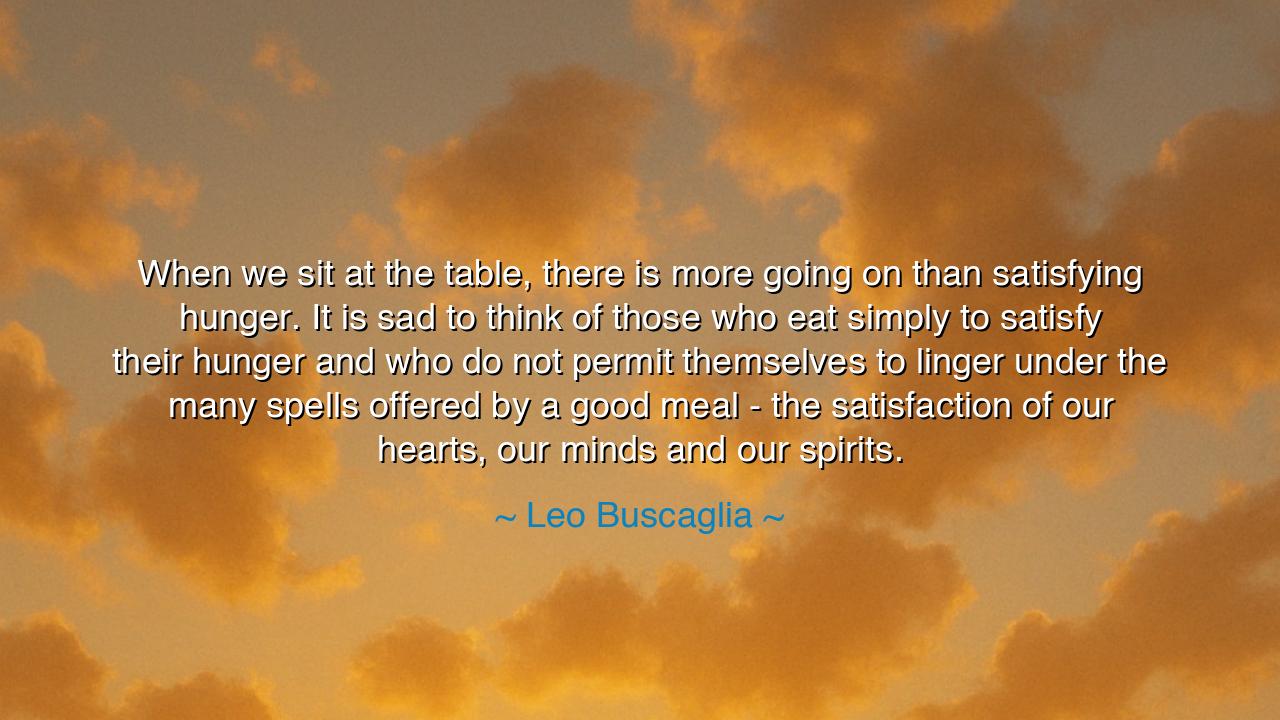
When we sit at the table, there is more going on than satisfying
When we sit at the table, there is more going on than satisfying hunger. It is sad to think of those who eat simply to satisfy their hunger and who do not permit themselves to linger under the many spells offered by a good meal - the satisfaction of our hearts, our minds and our spirits.






There are moments in life when a simple act becomes a mirror of the soul. Leo Buscaglia, in his reflection on the ritual of eating, said, “When we sit at the table, there is more going on than satisfying hunger. It is sad to think of those who eat simply to satisfy their hunger and who do not permit themselves to linger under the many spells offered by a good meal—the satisfaction of our hearts, our minds and our spirits.” In these words lies a profound truth: that nourishment is not merely physical, but emotional, intellectual, and spiritual. To eat without presence is to overlook a universe of meaning hidden within the ordinary.
Buscaglia’s insight echoes the wisdom of the ancients, who recognized the table as a sacred place. In ancient Greece, symposia were gatherings not merely for food and wine, but for conversation, reflection, and the sharing of philosophy. In China, the preparation and enjoyment of tea and meals were steeped in ritual, intended to cultivate harmony and mindfulness. The act of eating was, and is, an opportunity to feed not only the body but also the mind and spirit. To consume without attention, Buscaglia laments, is to miss the richness that life offers in its simplest forms.
The sadness he speaks of is rooted in the loss of presence and awareness. Those who eat merely to satisfy hunger are like travelers who pass through a sacred grove without noticing the sunlight, the song of birds, or the fragrance of flowers. They consume without communion, and in doing so, they deprive themselves of the deeper gifts that a meal can offer: the pleasure of taste, the joy of shared company, the reflection inspired by ritual and beauty. Food becomes sustenance only for the body, and the heart, mind, and spirit remain untouched.
Consider the example of Julia Child, who transformed the art of cooking into an experience of delight and exploration. To her, every meal was an opportunity to awaken the senses, to educate the mind, and to celebrate life. She taught that preparation and enjoyment are inseparable, and that to savor a meal fully is to embrace the richness of existence itself. Buscaglia’s reflection calls upon us to follow this path: to linger, to notice, to engage fully in what might otherwise seem mundane.
There is also a communal dimension to his words. Eating together has always been an act of connection. In the Bible, the breaking of bread is a symbol of fellowship and shared blessing; in Native American traditions, meals are moments to honor the earth and one another. When we allow ourselves to linger at the table, to share stories, laughter, and silence, we nourish bonds as essential as the food itself. To eat without this awareness is to deny ourselves the joy of human connection and the magic of shared life.
The lesson Buscaglia imparts is both simple and profound: treat each meal as an opportunity for fullness beyond the stomach. Savor each flavor, appreciate the craft of preparation, and honor the hands that brought the food to you. Engage with your companions, reflect on your blessings, and allow the act of eating to awaken gratitude and presence. In doing so, you transform an ordinary moment into a ritual of the heart.
We are reminded that life itself is like a meal: fleeting, rich, and to be savored. To rush through it, attending only to survival or routine, is to miss the subtleties and enchantments that give existence its depth. As Buscaglia suggests, it is in attention, reflection, and participation that nourishment becomes true sustenance.
Thus, when next you sit at a table, let his words guide you. Do not eat merely to fill your body. Linger under the spells of the meal, delight in its textures and aromas, converse with those around you, and feed your heart, mind, and spirit alongside your body. In this way, the ordinary act of eating becomes an extraordinary ritual, a celebration of life itself, reminding us that the fullness of living is found in awareness, gratitude, and communion.






AAdministratorAdministrator
Welcome, honored guests. Please leave a comment, we will respond soon